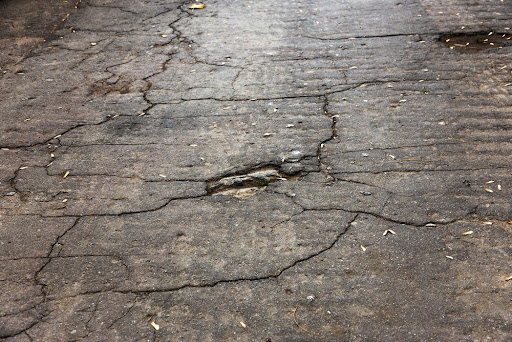- Unmasking Alligator Cracking: The Hidden Enemy of Asphalt Pavement
- Are Asphalt and Sealcoating Environmentally Friendly?
- Should I Repair My Potholes in Spring?
- 5 Important Questions You Should Ask Your Seal Coating Company
- How Does Snow Cause Potholes on Asphalt Roads?
- How Can Driveway Paving Add Value to Your Home?
- How Does Sealcoating Protect Driveways From Damage?
What Causes Driveways to Crack?

You walk out of your home one morning and go down to the driveway’s edge to pick up the morning paper. The sun is shining, the birds are chirping, your coffee is hot, and life is good. As you reach down to get the paper, that’s when you notice the dreaded cracks in your driveway. Cracks lead to potholes, and potholes lead to busted tires and a bad time for everyone. At one point or another, every homeowner has to deal with cracks in their driveways. Cracks form, tires can potentially be damaged, and you have to call in Superior Seal Coating, the asphalt driveway crack repair specialists in the Montgomery County, PA area. But how and why does your driveway crack and get to this point?
Natural Winter Causes
The winter months represent one of the most likely seasons in which cracks form in asphalt. The natural processes and reactions that occur due to the changes in the temperature and the weather have a clear cause and effect relationship with the cracks in your driveway. All asphalt is susceptible to cracks forming through changes in moisture retention and temperature changes. After heavy snow or rainfall, the moisture will seep through the surface and into the area below. Changes in temperature then cause the moisture to expand and cause cracks to form in asphalt. More often than not, the winter’s cycle of freezing and thawing generates the most cracks, but your driveway, parking lot, or other surfaces can still fall victim to asphalt cracking throughout the year.
Here Comes the Sun
It’s not just the extreme cold, snow, and subsequent thaw cycles that can lead to crack formation. While the cold winter months can cause a high volume of asphalt cracking, the other end of the spectrum can be just as hazardous. Extreme heat can cause the asphalt to expand, with the pressure causing cracks to form. During the peak times in the summer, where the days are longer and the temperatures climb to dangerous levels, the heat can also begin to create cracks in your asphalt. If left untreated, these cracks can balloon into larger problems.
Ground Shifting
Another common cause of asphalt cracking stems from the earth shifting beneath your asphalt. Most asphalt driveways are laid atop a layer of gravel. Throughout the driveway’s lifetime, either through the natural movement of the earth or for more extreme reasons (such as heavy storms), the gravel will shift and cause cracks to form as everything begins to settle.
The Asphalt's Age
The age of your asphalt plays a large role in its overall susceptibility to damage. The older your asphalt is, the more likely it is to develop cracks. As it gets further along, the material begins to degrade and loses its natural ability to withstand your surface’s daily pressures. So when that significant rainfall or that freeze and thaw cycle comes, older driveways are more likely to suffer damage.
What You Can Do
Every homeowner hates seeing cracks develop in their driveways. It makes getting out the door and on the way to work more challenging than it needs to be. While it appears that there is little you can do to combat crack formation, there are still steps you can take to keep your driveway looking its best.
Regularly Monitor For Cracks
As time moves on, keeping an eye out for cracks as they start to form can help you stay on top of them before they snowball. If you see cracks developing, you can call in the Superior Seal Coating team to fill the cracks before becoming a full-blown pothole.
Seal Your Driveway
One of the best ways to protect your driveway from cracking, oil damage, and general wear tear remains by sealing it regularly. The recommendation is to have your driveway sealed once every three years to get the maximum protection from potential damage and keep your driveway’s pristine appearance. Having a regular maintenance routine in place is essential to keep the cracks from spreading. For the cracks that become too much for you to handle on your own, calling in Superior Seal Coating to assess and address the issue is your best course of action. Are you in need of a parking lot line striping contractor’s services in Philadelphia County, PA, and the surrounding areas? If yes, contact Superior Seal Coating to get a free quote for your commercial or residential property today!